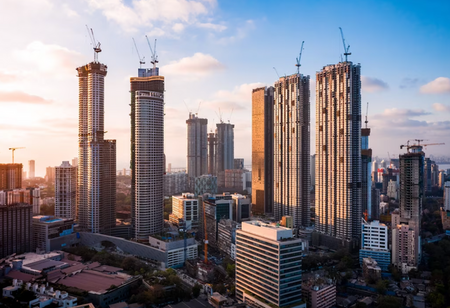
According to Colliers' APAC trends Investor Outlook 2023, India's real estate market has emerged as the most desired destination for global investors in the Asia-Pacific region, receiving over $23 billion since 2018, accounting for 77% of total investments during this period. According to Colliers data, institutional investment in real estate increased by 27% year on year in the first nine months of 2023, with a rise in deals targeting both the industrial and residential sectors. This rise, according to the firm, is closely related to the country's growth trajectory.
"India's preference for Asia Pacific growth markets is growing, owing to the country's strong economic performance, improved regulatory framework, and robust demand across multiple real estate sectors." "Global investors have consistently preferred the Indian real estate market, infusing more than $23 billion since 2018, accounting for 77% of total investments during this period," stated Vimal Nadar, Senior Director and Head of Research at Colliers India.
Nadar went on to say that the United States remains the leading investor, accounting for roughly 44% of all foreign inflows, followed by Canada and APAC, each accounting for 25%. According to the Canada-based management organization, India will continue to be one of the world's fastest-growing major economies, driven by private consumption and capital formation.
"As more established markets begin to stabilize, investors are becoming more confident in expanding their search for opportunities in emerging markets." "Investment opportunities in India are expanding across office, logistics, private credit, residential, and data centers," said Piyush Gupta, Managing Director, Capital Markets & Investment Services, India.
Going forward, global investors remain optimistic about India
According to the survey, the Indian real estate market today offers stable returns along with appealing pricing, improved valuations, and greater yields to global and APAC investors. "Foreign investors are likely to remain bullish on the Indian market over the next few quarters, as the interest cycle continues to reverse, and the yield spread between bonds & real estate continues to widen, making real estate an attractive proposition," he said.
Data Centers are attracting institutional investors.
According to the research, institutional investors are notably capitalizing on India's data center boom, which has been fueled by the asset class's stable income, better yields, and supportive legislative framework, which has infused $1.1 billion since 2020. According to the report, India is rapidly rising as a data center destination, with the business estimating $10 billion in investment in the local sector over the next three years alone.
Office space continues to be the Most Popular Option
According to the poll, institutional investors in India are still betting on the office sector, citing more opportunity, sustained demand, good growth prospects, and the availability of exit options through REITs. Institutional investments in office assets surged 1.6 times year on year to $ 2.9 billion in 2023, accounting for nearly 63% of total inflows in the first nine months of this year. According to the research, while global investors continue to dominate funding operations, with growing participation in entity-led agreements, domestic investors have become more involved in the sector. "We're also seeing more regional investors and funds beginning to underwrite India as a market, and to understand its dynamics as part of a wider investment strategy," the report said.
It went on to say that performance credit, special situations, portfolio acquisitions, asset reconstruction, and similar structures are all gaining in popularity and are likely to attract additional investment. "A lot of foreign funds are thinking about what big markets in the region they can invest in, and India has been the net beneficiary of that." "It's become a very institutional market, dominated by Canadian and Singaporean capital, particularly in the office and logistics sectors," said Chris Pilgrim, Managing Director, Global Capital Markets, Asia Pacific.
APAC Growth Markets are predicted to be very active
Colliers predicts a more favorable 2024 than 2023, with a lot of pent-up equity waiting for a home. "Particularly within the APAC region, investors are aware of the resilience of the asset class and the growth opportunities offered in rapidly maturing markets such as India and South Korea," the research stated.
Notably, Colliers APAC Outlook is based on a series of interviews with senior Colliers specialists, as well as a poll of over 900 property investors, 400 of whom were from Asia Pacific, performed in October and November 2023. The survey data indicates an increase in the proportion of investors expecting to increase their real estate allocations. Almost 60% of APAC investors believe that robust regional economic growth will benefit the real estate market. The survey data indicates an increase in the proportion of investors wanting to increase real estate allocations, with 75 percent planning to devote 5-20% of assets under management to real estate in the future, up from 64 percent now.
More ESG Goals Awareness in the Real Estate Sector
The paper also emphasized the growing awareness of Environmental, Social, and Governance (ESG) objectives. According to the report, since ESG has become increasingly important to occupiers and investors worldwide, Indian investors have begun to develop ESG strategies that are linked with their long-term ESG goals.
"Although at a nascent level, investors have started monitoring & reporting their environmental impact as a part of due diligence and asset management activities aiming for long term resilience and growth of their businesses," according to the research. According to the survey, office assets have experienced greater adoption of green certifications due to rising demand for green buildings and higher rental premiums compared to other asset classes. According to the report, 28% of APAC investors reported completely examining the ESG performance of their investments, up from just over 20% last year.

